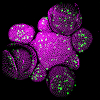
A group of 30 A-level pupils spent an afternoon at the Sainsbury Laboratory as part of their participation in Newnham College’s ‘Women in Science’ residential course. The girls were given a challenging task by academic visitor Alexis Peaucelle, and rose to the occasion magnificently. They were given seedlings from various lines of Arabidopsis plants. Arabidopsis is a small plant widely used to study plant biology because it is convenient to grow in the lab. The lines were engineered so that each one showed where a particular gene was switched on.
Working in groups, the girls studied the lines to establish where each gene was on and came up with theories to explain their observations. What sort of genes were in play? The girls grappled with ideas of genes being switched off and on in both time and space and many other concepts. Even the girls who had not taken A-level biology plunged into the task, and in some cases asked the most interesting questions.
After working independently on their seedlings, each group presented their findings to the larger group. This led to further discussions as hypotheses were offered and analysed. Alexis encouraged the girls to develop plausible alternative hypotheses to fit the same observations. The emphasis was on coming up with ideas and discussing them, not getting the ‘right’ answer; ‘We got weird results’ was met with ‘how interesting!’
This exercise was as much about the scientific process as it was about plant genetics. The girls learned to formulate and discuss hypotheses, make close observations, and start to consider the huge range of factors that can influence plant development. The workshop was designed to be a process of discovery, discussion and idea building.
This way of working collaboratively and independently, along with an array of new concepts and vocabulary, made it a challenging workshop for the girls. Their concentration, perseverance and willingness to have a go outside their comfort zone were impressive. Feedback praised Alexis’ enthusiasm, noted that this workshop was a new experience in terms of content and format, and although at times bewildering, it was also a lot of fun! We very much hope to see some of these students back in the Lab in 5-10 years’ time, so they can continue to get interesting, weird results!





